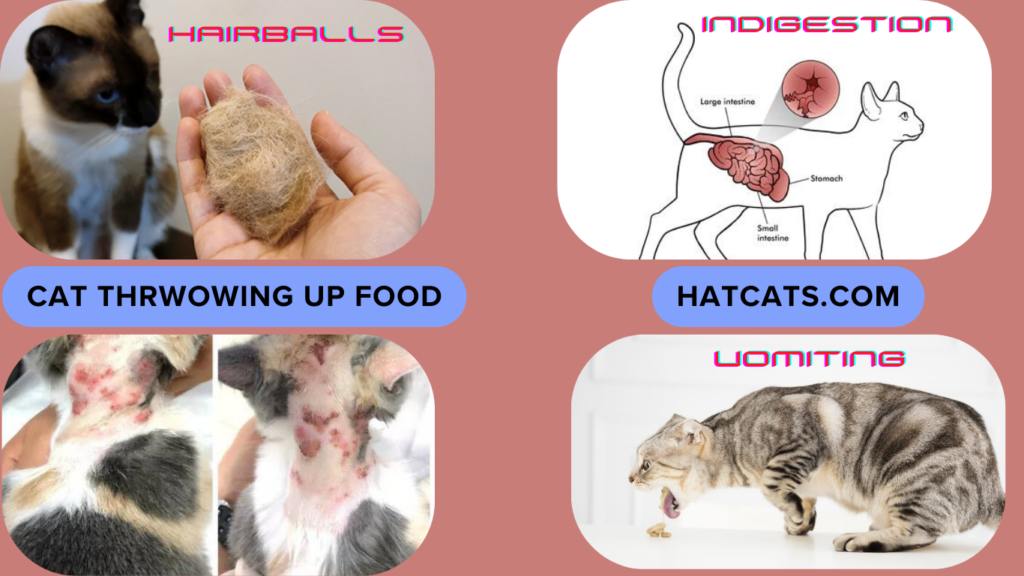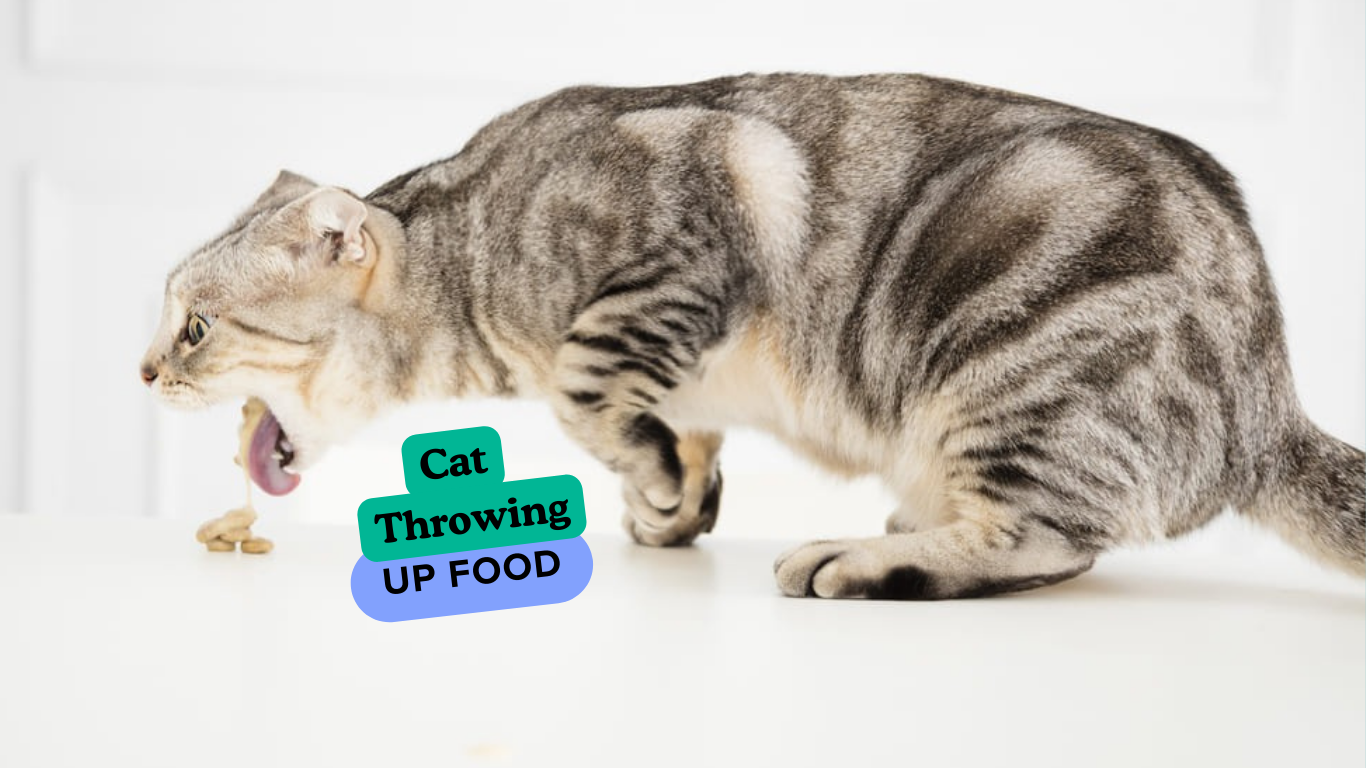Introduction
As a responsible pet owner, it’s important to be well-informed about your feline companion’s health. In this detailed article, we’ll cover everything you need to know about cat throwing up food, including its causes, diagnosis, home remedies, prevention tips, and more.
Whether you’re a new cat owner or an experienced enthusiast, this guide will equip you with valuable insights to ensure the well-being of your beloved pet. Let’s dive in!
Table of Contents
Understanding Cat Vomiting
What is Cat Throwing Up Food?
Cat throwing up food, also known as feline regurgitation, is when your cat brings up undigested food without the preceding nausea or abdominal contractions commonly associated with vomiting. This can be caused by various factors such as gastrointestinal issues, megacolon, megaesophagus, food allergies, or dental problems.
If your cat is regurgitating frequently or showing other concerning symptoms, it’s important to consult with your veterinarian for proper diagnosis and treatment.
Is Cat Throwing Up Food Normal?
While occasional instances of cat throwing up food may not be cause for immediate concern, frequent or persistent regurgitation can signal an underlying health issue. It’s essential for pet owners to observe their cat’s vomiting behavior and assess whether it deviates from normal patterns. Keep an eye on the frequency, consistency, and accompanying symptoms to determine if further investigation is warranted.
Common Causes of Cat Throwing Up Food
Cat throwing up food can be caused by a variety of factors, ranging from minor issues to more serious medical conditions.
Some common causes include:
- Hairballs
- Dietary indiscretion
- Food allergies
- Gastrointestinal obstructions
- Pancreatitis
- Inflammatory bowel disease (IBD)

When to Be Concerned
It is important to pay attention to any concerning symptoms that may accompany your cat’s vomiting. These symptoms can indicate a more serious underlying issue that requires immediate veterinary attention. Some signs to look out for include lethargy, loss of appetite, abdominal pain, and blood in vomit.
If your cat is vomiting frequently or if the vomiting persists for more than a day, it is important to seek veterinary care. Prompt intervention can help prevent any potential complications and ensure your cat’s health and well-being.
Diagnosing the Issue
Veterinary Examination
A comprehensive veterinary examination is crucial for accurately diagnosing the cause of your cat’s vomiting. During this examination, your veterinarian will conduct a physical assessment and ask about the frequency and appearance of the vomiting episodes. They may also recommend additional diagnostic tests to gather more information about your cat’s condition.
Diagnostic Tests
To diagnose your cat’s vomiting, your veterinarian may recommend a variety of tests. These tests can provide valuable information about your cat’s overall health and any potential underlying conditions that may be causing their vomiting. Common tests include:
- Blood work
- Urinalysis
- Imaging studies such as X-rays or ultrasound
In more severe cases, your veterinarian may also recommend endoscopy or biopsies to further evaluate your cat’s digestive tract. These tests are essential in determining the best course of treatment for your cat’s well-being.
Home Remedies and Solutions
Dietary Changes
Making strategic dietary changes can play a pivotal role in managing and preventing cat vomiting. Transitioning your cat to a specialized diet that addresses potential food allergies or sensitivities, as well as incorporating hairball control formulas, can significantly reduce the occurrence of vomiting episodes.
It’s important to consult with your veterinarian before implementing any dietary changes to ensure they align with your cat’s specific nutritional needs.
Natural Remedies
In addition to dietary changes, there are various natural remedies that can help alleviate vomiting and promote digestive health in cats. These remedies can be used in conjunction with conventional treatments and can contribute to maintaining your cat’s overall well-being.
It is important to consult with your veterinarian before trying any natural remedies to ensure they are suitable for your cat.
Medical Treatment Options
In cases where cat vomiting is linked to an underlying health condition, medical treatment may be necessary. This can include medications to address inflammation, nausea, or infections, as well as fluid therapy or dietary changes. In rare cases, surgery may be required.
It’s important to follow your veterinarian’s instructions and attend follow-up appointments to monitor your cat’s response to treatment.
Prevention Tips for Cat Throwing Up Food
Feeding Practices
Feeding your cat small, frequent meals throughout the day can help prevent overeating and vomiting. Make sure to provide fresh water at all times to prevent dehydration and digestive issues. Create a calm and stress-free environment for your cat during mealtimes by feeding them in a quiet area and using a pheromone diffuser.
Elevated feeding stations and slow feeder bowls can also help regulate your cat’s eating and reduce the chances of vomiting. Remember to monitor your cat’s eating habits and consult with your veterinarian if vomiting persists.
Environmental Factors
Environmental factors can greatly impact your cat’s digestive health, leading to vomiting and other digestive issues. Stress, toxins, temperature changes, and parasites are all potential triggers for vomiting in cats.
To prevent this, it’s important to create a comfortable and safe living environment for your cat, minimize exposure to potential stressors and toxins, and address any other environmental factors that may be contributing to your cat’s vomiting. By taking these steps, you can help promote a healthier digestive system for your feline friend.
Conclusion
In conclusion, understanding and addressing cat throwing up food is a multi-faceted endeavor that necessitates attentiveness, proactive measures, and informed decision-making. By gaining insights into the causes, diagnostic approaches, remedies, and preventive strategies outlined in this guide, you are better equipped to navigate your cat’s health journey with confidence and compassion.
Remember, maintaining open communication with your veterinarian and prioritizing your cat’s well-being are essential components of effective feline care. We hope this comprehensive resource empowers you to provide the best possible support for your cherished feline companion.
If you have any concerns about your cat’s vomiting behavior, don’t hesitate to seek professional veterinary guidance for personalized assistance. Your proactive approach to feline health is a testament to your dedication as a caring and responsible pet owner.

